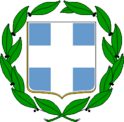|
|

Population of Greece from 1961 to 2003. Data FAOSTAT, year 2005 The Demographics of Greece is about the population that has inhabited the Greek peninsula, a region where the Greek language has been continuously spoken for over 3500 years. The 2001 census of Greece reported a population of 10,964,020 people. Historical Overview Greece was inhabited as early as the Paleolithic period and by 3000 BC had become home, in the Cycladic Islands, to a culture whose art remains among the most evocative in world history. The Minoans were challenged and eventually supplanted by the Mycenaeans of the Greek mainland, who spoke a dialect of ancient Greek. Prior to the second millennium BC, the Greek peninsula was inhabited by various pre-Hellenic peoples (notably the Pelasgians). After the invasion of the Greek-speaking peoples, the local populations were displaced or assimilated and the ancient Greek civilization was formed. The Greek language dominated the peninsula, and Greece's mosaic of small city-states became culturally similar. The population estimates on the Greeks during the 5th century BC, is approximately 3 million on the Greek peninsula and 6 million in the entire Mediterranean basin (including all colonies). After Alexander the Great's conquests, Greek culture and colonization was expanded in the Hellenistic Kingdoms of the East. After the Roman occupation of Greece, the Greek culture was favoured by the Romans and it continued to dominate on the Eastern part of the Empire and in Rome. After the foundation of Constantinople in 330 AD by Constantine the Great, the Eastern Roman Empire developed independently from the West. It continued the use of Greek until it totally displaced Latin from the administration, and the empire became ethnically unified via the official adaption of Christianity. The most common term used by scholars to refer to that medieval state is 'Byzantine'. During the long history of the Byzantine Greek state, the Greek peninsula was occasionally invaded by the following peoples: Goths, Avars, Slavs, Normans, Franks and other Latins who had betrayed the Crusades. The only group however which planned to established permanent settlements in the region were the Slavs. They settled in isolated valleys of Peloponnese and Thessaly, establishing communities that were referred by the Byzantines as "Sclavinias". By the 9th century AD, Sclavinias in Greece were largerly eliminated. The populations in central and southern Greece were the subject of population exchanges, army recruitments and Hellenizations, but some Slavic communities managed to survive in rural Macedonia. At the same time a large Jewish emmigrant community from Spain established itself in Thessaloniki. The Byzantine Empire ultimately fell to Ottoman Turks in 15th century. Ottoman colonies were established in the Balkans, notable in Macedonia, Peloponnese and Crete. The Christian subjects of the Sultan had very restricted rights, and during that period many religious conversions took place. For those reasons, the population of the region decreased, yet it remained largerly ethnically similar, as the Christians didn't have the right to use any means of transportation. The only notable event however, was the gradual settlement of Arvanites and Vlachs in isolated communities throughout the Greek peninsula. Some of the ancestors of those settlers survive until today, but only as linguistic groups of purely Greek ethnic identity. The population exchanges with Bulgaria and Turkey that took place in the early 20th century, added in total some 2 million Greeks from Asia Minor, Constantinople, Bulgaria, Albania and Yugoslavia to the demography of the Greek Kingdom. Education Greek education is free and compulsory for children between the ages of 5 and 15. English language study is compulsory from 5th grade through high school. University education, including books, is also free, contingent upon the student's ability to meet stiff entrance requirements. A high percentage of the student population seeks higher education. More than 100,000 students are registered at Greek universities, and 15% of the population currently holds a university degree. Entrance to a university is determined by state-administered exams, the candidate's grade-point average from high school, and his/her priority choices of major. About one in four candidates gains admission to Greek universities. The Greek law does not currently offer official recognition to the graduates of private universities that operate in Greece. As a result, a large and growing number of students are pursuing higher education abroad. The Greek Government decides through an evaluation procedure whether to recognize degrees from specific foreign universities as qualification for public sector hiring. Other students attend private, post-secondary educational institutions in Greece that are not recognized by the Greek Government. The number of Greek students studying at European institutions is increasing along with EU support for educational exchange. In addition, nearly 5,000 Greeks are studying in the United States, about half of whom are in graduate school. Greek per capita student representation in the U.S. is the highest of any European country.
Religion Eastern Orthodox Christianity is the official and dominant religion in Greece. During the centuries of Ottoman domination, the Greek Orthodox Church preserved Greek language, values, and national identity and was an important rallying point in the struggle for independence. There is a Muslim minority concentrated in Thrace, the majority of which has a Turkish ethnic identity. There are also a number of Jews in Greece, most of whom live in Thessaloniki.
Linguistic groups See also: Linguistic and cultural minorities in Greece A survey conducted by the VPRC Institute in September 2001 and published by Eleftherotypia at 21 October 2001 found the following results about the mother tongue of the respondents:
The survey mentioned that most of the respondents were using the Greek language in everyday life. The survey also mentioned that besides Greek, the respondents were also speaking the following languages:
Statistics Population: 10,964,020 (2001 Census) Age structure:
Population growth rate: 0.19% (2005 est.) Birth rate: 9.72 births/1,000 population (2005 est.) Death rate: 10.15 deaths/1,000 population (2005 est.) Net migration rate: 2.34 migrant(s)/1,000 population (2005 est.) Sex ratio:
total population: 0.96 male(s)/female (2005 est.) Infant mortality rate: 5.53 deaths/1,000 live births (2005 est.) Life expectancy at birth:
Total fertility rate: 1.33 children born/woman (2005 est.) Nationality: noun: Greek(s) adjective: Greek Ethnic groups: Greek 98%, other 2% Religions: Greek Orthodox 98%, Muslim 1.3%, other 0.7% Languages: Greek 99% (official), English, French Literacy: definition: age 15 and over can read and write total population: 97.5% male: 98.6% female: 96.5% (2003 est.)
References Report on minority language survey by VPRC, published by Eleftherotypia. Η γλωσσική μας ποικιλία (Οur linguistic diversity) The newspaper article presenting the VPRC survey.
Retrieved from "http://en.wikipedia.org/"
 |
||||||||||||||||||||||||
|
|

